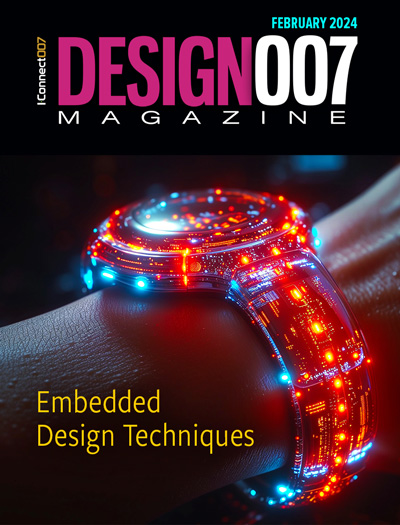-

- News
- Books
Featured Books
- design007 Magazine
Latest Issues
Current Issue
Level Up Your Design Skills
This month, our contributors discuss the PCB design classes available at IPC APEX EXPO 2024. As they explain, these courses cover everything from the basics of design through avoiding over-constraining high-speed boards, and so much more!

Opportunities and Challenges
In this issue, our expert contributors discuss the many opportunities and challenges in the PCB design community, and what can be done to grow the numbers of PCB designers—and design instructors.

Embedded Design Techniques
Our expert contributors provide the knowledge this month that designers need to be aware of to make intelligent, educated decisions about embedded design. Many design and manufacturing hurdles can trip up designers who are new to this technology.
- Articles
- Columns
Search Console
- Links
- Events
||| MENU - design007 Magazine
A New Gathering Place for Designers
December 15, 2022 | Andy Shaughnessy, Design007 MagazineEstimated reading time: 2 minutes
IPC APEX EXPO started out as a show for the PCB manufacturing community, but it’s grown beyond that. This year, there’s more design curriculum at the show in San Diego than ever before. IPC instructor Kris Moyer has been instrumental in leading the organization’s efforts around PCB design and design engineering curriculum. So, I asked him the million-dollar question.
Andy Shaughnessy: Kris, why should PCB designers attend IPC APEX EXPO this year?
Kris Moyer: Because it is the definitive gathering of the electronics manufacturing industry. It is an opportunity to network with peers, representatives from all sectors of the industry. These include fabricators, assemblers, material suppliers, and equipment vendors to name a few. This makes the show a great opportunity to learn and grow knowledge in all aspects of the industry and how they might impact the designer. Additionally, the Professional Development Courses allow the designer access to training and knowledge direct from industry gurus.
Shaughnessy: I’ve noticed that there are more PCB design classes set this year. IPC seems to be expanding the amount of design content at the show every year. Is this part of IPC’s roadmap?
Moyer: Yes, it is. IPC is committed to supporting and growing the designers in this industry. We all know the challenges we are facing, with so many designers reaching retirement age and not as many new designers following in their footsteps. Because we are aware of this challenge, we are actively using our resources to improve the situation.
Shaughnessy: The IPC Design Competition returns this year. Will you be involved in that again?
Moyer: Yes, I am one of the judges as well as involved in the conception of the design projects. I’ve seen the number of competitors and it looks to be really interesting.
Shaughnessy: You teach a variety of design classes for IPC. What are the biggest challenges you see facing PCB designers today?
Moyer: As the speeds of designs increase, there is an increase in the need for designers to understand and grasp many engineering concepts that were not previously part of the designer’s skill set. These include signal integrity, power integrity, material properties, manufacturing processes pros and cons, assembly processes pros and cons, to name a few. Designs are only going to get more complex, and faster, and of course smaller.
Shaughnessy: Is there anything else you’d like to add?
Moyer: As a PCB designer who has been attending IPC APEX EXPO for almost 20 years, I can say I would not have been as successful in my career had it not been for the networking and knowledge I gained there.
Shaughnessy: Thanks for talking with me, Kris.
Moyer: Thank you, Andy.
This conversation appeared in the December 2022 issue of Design007 Magazine. For more information about PCB design curriculum at IPC APEX EXPO, click here.
Suggested Items
KIC’s Miles Moreau to Present Profiling Basics and Best Practices at SMTA Wisconsin Chapter PCBA Profile Workshop
01/25/2024 | KICKIC, a renowned pioneer in thermal process and temperature measurement solutions for electronics manufacturing, announces that Miles Moreau, General Manager, will be a featured speaker at the SMTA Wisconsin Chapter In-Person PCBA Profile Workshop.
The Drive Toward UHDI and Substrates
09/20/2023 | I-Connect007 Editorial TeamPanasonic’s Darren Hitchcock spoke with the I-Connect007 Editorial Team on the complexities of moving toward ultra HDI manufacturing. As we learn in this conversation, the number of shifting constraints relative to traditional PCB fabrication is quite large and can sometimes conflict with each other.
Standard Of Excellence: The Products of the Future
09/19/2023 | Anaya Vardya -- Column: Standard of ExcellenceIn my last column, I discussed cutting-edge innovations in printed circuit board technology, focusing on innovative trends in ultra HDI, embedded passives and components, green PCBs, and advanced substrate materials. This month, I’m following up with the products these new PCB technologies are destined for. Why do we need all these new technologies?
Experience ViTrox's State-of-the-Art Offerings at SMTA Guadalajara 2023 Presented by Sales Channel Partner—SMTo Engineering
09/18/2023 | ViTroxViTrox, which aims to be the world’s most trusted technology company, is excited to announce that our trusted Sales Channel Partner (SCP) in Mexico, SMTo Engineering, S.A. de C.V., will be participating in SMTA Guadalajara Expo & Tech Forum. They will be exhibiting in Booth #911 from the 25th to the 26th of October 2023, at the Expo Guadalajara in Jalisco, Mexico.
Intel Unveils Industry-Leading Glass Substrates to Meet Demand for More Powerful Compute
09/18/2023 | IntelIntel announced one of the industry’s first glass substrates for next-generation advanced packaging, planned for the latter part of this decade.


